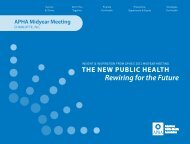EVIDENCE
missingevidence-digitalpdf-singlepages_2016
missingevidence-digitalpdf-singlepages_2016
You also want an ePaper? Increase the reach of your titles
YUMPU automatically turns print PDFs into web optimized ePapers that Google loves.
Inquiry methods<br />
The Rt Hon Sir Stephen Sedley, who is leading the inquiry, is a privy counsellor and former Lord Justice of Appeal.<br />
He has served as an ad hoc judge of the European Court of Human Rights and has been a visiting professor<br />
at the University of Oxford. He is a trustee of Sense about Science.<br />
The report has been researched and co-authored by Dr Prateek Buch, policy associate and Dr Síle Lane,<br />
director of campaigns and policy at Sense about Science.<br />
Initial consultations with members of the research community, civil servants, and politicians helped us to frame<br />
the inquiry’s call for evidence (see below), which we issued in November 2015. We invited written submissions<br />
and interviewed interested parties to gather evidence.<br />
We have benefited greatly from the written submissions, oral contributions and advice from the people listed<br />
in Appendix II, but the content of this report is the responsibility of its authors.<br />
The inquiry and the production of this report were supported by a grant from the JRSST Charitable Trust<br />
(Registered Charity No: 247498) and by Nick Ross.<br />
Call for evidence<br />
Tuesday 24th November 2015<br />
Sense about Science is seeking information and views about how government commissions and publishes research<br />
from the academic community, professional bodies, the civil service, charities, the media and other interested parties.<br />
Research conducted or commissioned by central government is an important part of guiding, developing,<br />
modifying and monitoring policy. Although departmental guidelines require prompt and complete publication<br />
of such research, there have been repeated allegations in recent years of publication being held back.<br />
This has raised public concerns for a number of reasons:<br />
• Failure to make publicly-funded research available to the public.<br />
• A lack of transparency on the basis of government decisions and the role of evidence in reaching them.<br />
• Potential effects on the willingness of researchers to assist in policymaking.<br />
It is not known how significant or widespread the delayed publication or withholding of government research<br />
is, and there is little comparative evidence of how different departments or agencies behave. There will also<br />
be examples of good practice, for instance where potentially awkward research has been published promptly.<br />
Sense about Science is conducting an inquiry, to be led by one of its trustees, the Rt Hon Sir Stephen Sedley,<br />
into the scale and sources of the problem, and into possible remedies. An initial scoping exercise was conducted<br />
between 18th September and 30th October 2015 to establish this call for evidence.<br />
The inquiry will consider the publication of research, including analyses of official statistics, initiated by Whitehall<br />
departments and the arm’s length bodies that report to them. We also welcome submissions relating to devolved<br />
administrations, but not to local authorities. The inquiry will consider what has happened in established instances<br />
of research being held back, and will suggest how controversial or inconclusive research can be handled.<br />
We invite submissions about your experience of commissioning, conducting, publishing or accessing government<br />
research, particularly in the following contexts:<br />
1 Contracts and rules: do research contracts make publication principles clear? Are these principles ethically<br />
and legally appropriate? Who is responsible within departments for ensuring that research is published<br />
promptly and fully?<br />
2 Expectations of publication: these vary, especially as regards the timing of the announcement of policy<br />
and in relation to controversial topics. What justifications may there be for delaying or withholding publication<br />
of government-commissioned research?<br />
3 Potential improvements: what changes would improve the way government commissions, conducts<br />
and publishes research? How can good practice be spread?<br />
APPENDIX I: INQUIRY METHODS AND CALL FOR <strong>EVIDENCE</strong><br />
40



